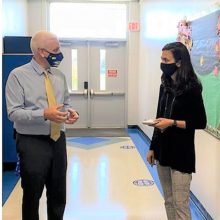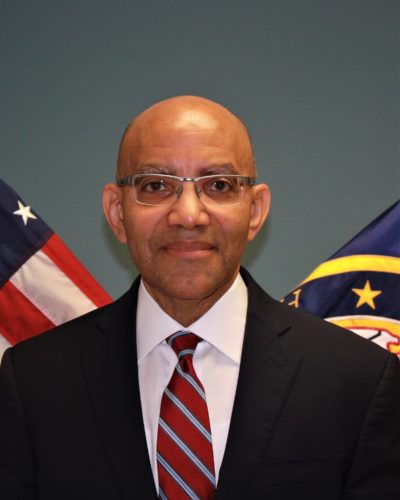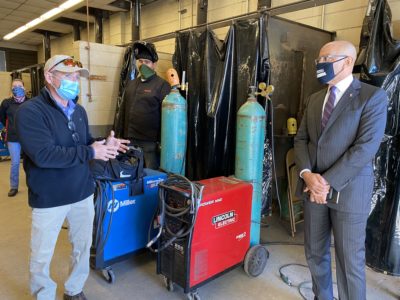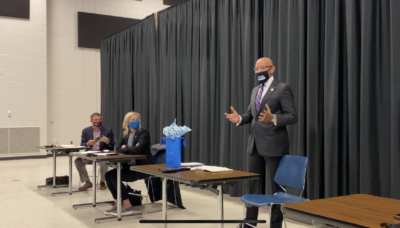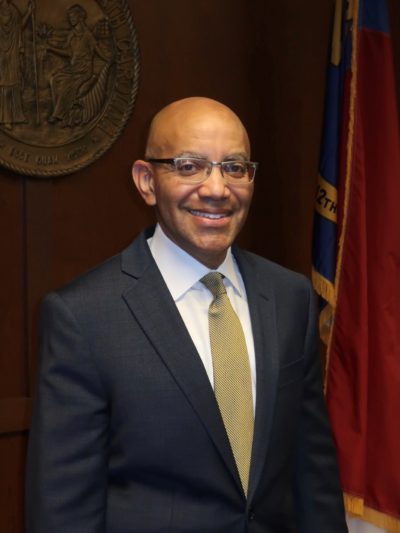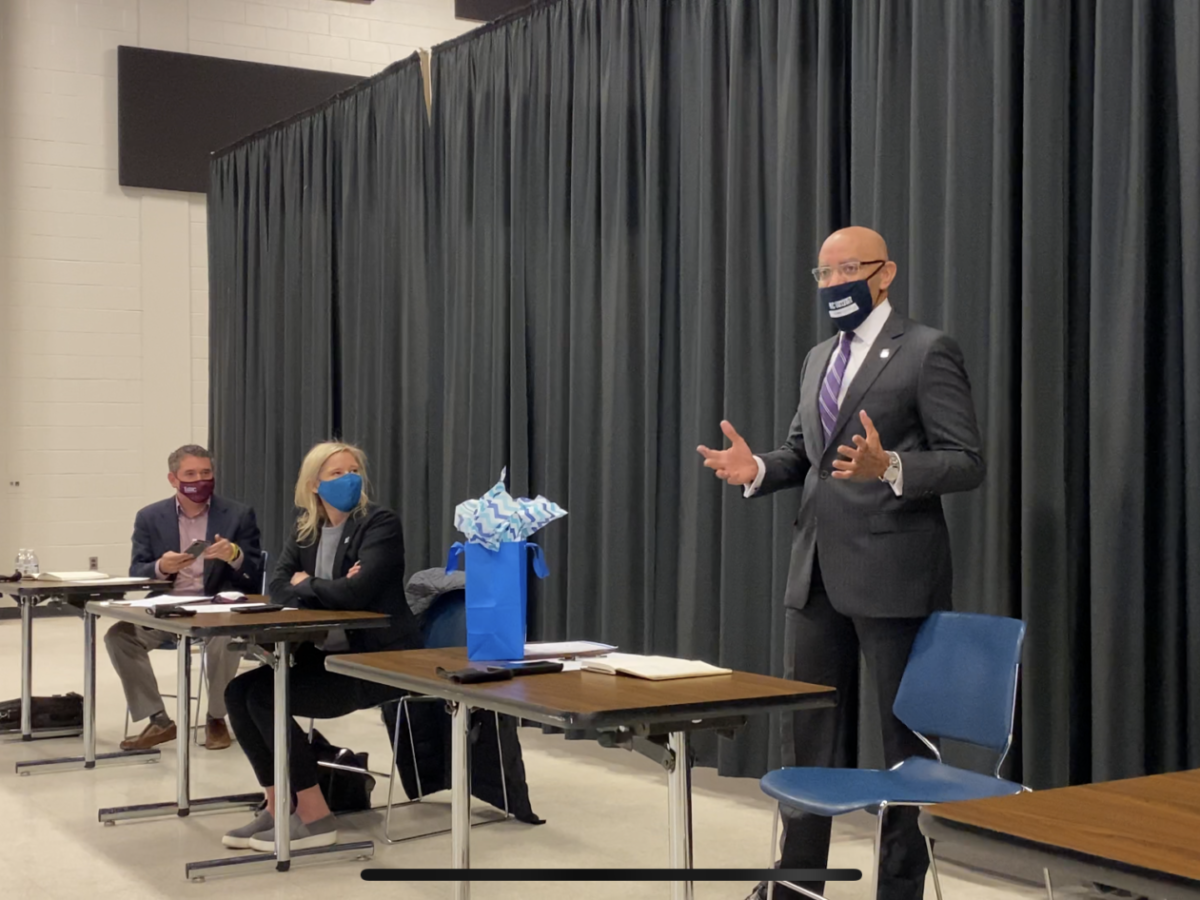
|
|

Lessons from the past school year. Plans for the year ahead. In this special report, EdNC looks at how the pandemic impacted education and what that means for the future. Read the rest of the series here.
What was it like to be a state education leader during an unprecedented school year? We interviewed three of those leaders — Rebecca Planchard, Eric Davis, and Thomas Stith — to hear their reflections on the pandemic and thoughts about the future of education.
Below is our interview with Thomas Stith, president of the North Carolina Community College System. Stith began his tenure as president in January 2021, entering the role at a time when COVID-19 continued to impact the 58 community colleges across the state. We discussed how he prepared for the role, what the future might hold for community colleges, and more.
This interview, which was held in April 2021, has been edited for length and clarity.
Sorrells: Let’s start by looking in the rearview mirror. I know you came into this position in January. Looking back, how did you prepare for the role of system president given the fact that the pandemic was already ongoing?
Stith: Fortunately, my career here in North Carolina really prepared me for this role. I had a good combination of both private and public sector executive-level leadership. I had exposure to higher ed as well through work experience. So from a knowledge base, I felt very comfortable with the transition.
In my previous role before joining the community college system, we had a statewide organization, and we had to look at the impact not only in a specific area, but across North Carolina as well. So I felt comfortable.
We are all learning as we go through this — it’s a global pandemic. But I felt comfortable that for my career experiences, and literally having to work through the challenges of the COVID-19 pandemic, that that would be very helpful in this role.
Sorrells: Since you’ve entered the role, what are some bright spots you’ve seen across the state’s 58 community colleges, and can you share any specific stories or examples that come to mind?
Stith: Sure. That’s what energizes you each and every day. Not only here at the system office, but throughout our 58-college system — it’s just the passion and commitment to the mission of the community college system. And that’s providing educational opportunities that lead to success for our students, whether they’re newly minted high school graduates entering, pursuing an associate or workforce training, or individuals that have been displaced from their current employer by the pandemic.
Our community college system has provided the opportunity for future success. And I see that across the state. I am able to go out and visit our campuses on the ground. And I think that’s very important, not only for the president of the system, but I encourage all North Carolinians — they’re there in your community, and make sure you’re engaged with the colleges.
A couple of examples would be a few weeks ago, I toured Pitt Community College. They had classes ongoing on campus. And they actually were high school students that were learning electronics. They had studied, for the previous several weeks, the formulas around how to make a gizmo. It was their spring break for high school. But yet they were on our college campus learning and investing in their future. And it just showed me the commitment that they have. Whether it’s a high school student or an individual for retraining, just the commitment to their own education and future down the road.
Just yesterday, we had a group from Forsyth Tech, and they brought not only some of their board and leadership, but they brought students with them as well. And to tell their story and the story of the community college system — I think it is much more powerful when you hear from our students.
You had a very first-generation young woman who was from a rural part of the state, and she will be the first to go to college. The early college has provided her a pathway to a four-year institution. You had an individual that literally arrived in Winston-Salem, with no money, no car, no home, and at that point, no future. But he rose to the occasion. Now he is the SGA President for the college and is working for Corning as well.
What inspires me is not only the lofty goals that we have as a system, but it’s when you talk to the students. In many cases, it’s changing lives, and in some cases, it is saving lives. To me, that’s the real story of the community college system.
—Thomas Stith, N.C. Community College System President
Sorrells: Now looking ahead to the future, how, if at all, do you think community college education will be changed, for better or for worse, because of the pandemic?
Stith: One of the large impacts that we saw during the pandemic was the continuation of the expansion of broadband. We already had some colleges that were involved with virtual instruction. But because of the pandemic, we were able to use federal funds to expand out into our rural areas. We were able to provide broadband connectivity to about 20 colleges. We have about another 20 to go.
But I think that change, creating that flexible learning environment, having instruction provided in a virtual manner, combined with in-class instruction — we never closed as a community college system. We had students come on campus throughout the process. But clearly, we had a significant shift in some of the classes that were more appropriate for online instruction. So as we move forward, we’ll look at the lessons learned from that combination of in-classroom and virtual and ensure that we’re providing the best experience for our students.
Sorrells: Do you think those virtual offerings will allow the system to reach more students in coming years?
Stith: Yes, it will reach more students, but it’s also providing opportunities in those communities that they serve. Those colleges in the rural areas, they would notice not only students literally in their parking lot taking advantage of the Wi-Fi, but it’s individuals from the community as well. Because sometimes we don’t think of it. We’re sitting here in Wake County in the state capitol, but you have cities and counties across the state that don’t have that connectivity. So I think it not only is going to have an impact for our students and increase engagement and enrollment in particular at our rural institutions. But it’s going to have an impact in those communities as well in a broader sense.
Related Readings…
Sorrells: What are some of your goals or hopes for the system during the next academic year?
Stith: I’ll frame it in a story that I like to tell. Too often, I’m in conversations and people say, “The community college system is the best-kept secret in North Carolina.” And they say that as a compliment. And I graciously nod — but to me, it’s not a compliment. It shows that we still have work to do. Because we don’t want to be a good-kept secret, we want to be a well-known benefit to the state.
So as we look to the fall, we want to ensure that we’re getting our message out about the vast opportunities that are available within the community college system, whether you want to become a nurse or go into IT or law enforcement training.
When I was out at Pitt, they have a very strong collaboration with the pharmaceutical industry there. So we have pathways, we have multiple articulation agreements at the system level, but also with individual community colleges, providing a pathway to a four-year degree. So our challenge as we look to the fall is to ensure that individuals are aware of what we have available, and also with our short term workforce training, those individuals that have been displaced because of the pandemic. We will see increased enrollment because of that. But my vision is that we will also see an increase in providing opportunities for the citizens of the state.
Sorrells: You mentioned articulation agreements and continuing to add those to the repertoire, and I know there was one signed yesterday.
Stith: Yes, that was with another one of our partners, the North Carolina Independent Colleges and Universities, for psychology and sociology. It provides a pathway to start at a community college and then transfer to one of the independent or private colleges. And we see that as just another way of expanding a pathway to opportunity.
We have similar articulation agreements with the University of North Carolina system. We recently developed curriculum for a pathway for individuals that would like to be teachers. They can start off, have a two-year experience at our college, and then transfer to a four-year institution.
So we see these articulation agreements as a way of benefiting from the strength of the educational ecosystem in North Carolina. We have a tremendous university system, public system, and we have a tremendous independent college and university system. We have the best community college system in the country. So we think it’s very important for those three entities of higher education to work in a collaborative manner.
We also feel very strongly about our K-12 environment. Those are our students of the future. So we want to make sure that we’re engaged in K-12 as well.
Sorrells: What is your biggest lesson learned from the events of the last year or so?
Stith: I’m not sure if it’s a lesson learned. It’s really an affirmation of what I believed. As a North Carolinian, I recognize the strength of our state and the people in North Carolina, and the diversity of the people in North Carolina. And what I learned was that is in fact true. Because I think that’s our competitive advantage in the market. Just seeing the people of North Carolina come together, work together, to overcome — this is a global pandemic that we’re all having to work through. But to see the people of North Carolina come together and continue to move forward was reaffirming of what I believed as a native of the state.
Sorrells: What has been your toughest moment of leadership since you started in this role, and what has been your brightest moment of leadership?
Stith: I think the toughest moment was a little more focused here at the system office. While we’ve had senior staff engaged here at the Caswell building, the majority of our staff has worked remote, as other agencies have as well. But we made a decision since my term began on the 11th to start to reenter our staff. So you’re balancing the need for public service — I firmly believe our role here in the system office is to serve as public servants — and the need to have accessibility to the public. At the same time, you have to balance that with health and safety concerns.
We very diligently thought through a phased-in reentry initiative and are in the process of doing that. As expected, the colleagues here in the building have been very excited as we do that in a safe and effective manner. So you’re balancing what I feel is a critical call as a public servant to serve, also with personal challenges around that health and safety issue. So we feel comfortable, and we think the response has been very positive.
What’s gotten me most excited? I would say it is really engaging with our students. While I love my colleagues here in Caswell, moving around the state — I’m averaging about one or so colleges a week when it’s not board week here at the system office. I learn something new every time I attend a campus. You can look at all the information here at the system office. But to go and to see the students engaged in class, the passion that the instructors have.
I was at Fayetteville Tech a few weeks ago, and they had a class with military individuals that were getting ready to transition to civilian life. So it was a class that was helping with that. They also had a program for veterans around IT and utilizing the skills they’ve learned as servicemen and women so that they would be able to compete once entering civilian life.
Again, just the engagement — not only from the students, but the passion from our faculty, as they engage. Every time I come back, the staff is ready for the next story. And we’re engaged, but I think it’s going to be important to … for us to continue as a system office staff to engage in a direct manner with our campuses, because it’s just really amazing work that’s being done.
Sorrells: That kind of ties into my last question about what’s giving you hope right now. Is there anything else you want to add to that?
Stith: For me, what gives me hope is seeing that resilience, seeing that passion across the state, and knowing that the community college system is positioned to not only lead this recovery, but to help the state sustain its growth. When I joined the system, I had three very clear components to my vision for the community college system: to serve as the first choice for affordable and accessible education, to lead this recovery and economic growth for the state, and thirdly and foundationally, to become a national model for diversity and inclusion.
Because of our diverse state and the diversity of our people, I really think we have a key foundational competitive advantage, and we want to serve as a national model for how to utilize that diversity and enhance our system. We are continuing to pursue our mission. And we are serving as that first choice for affordable, accessible education. I think not only for the short term, but looking into the future, those three components will ensure that we will not be a best-kept secret any longer, and others will understand the benefit we have to the state. And from a national perspective, we will establish ourselves — while we are the third-largest system, I truly believe we are the best system in the country.
